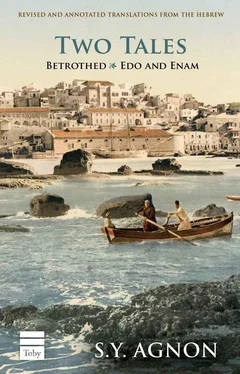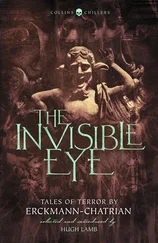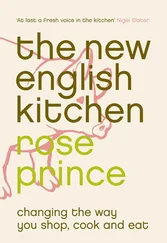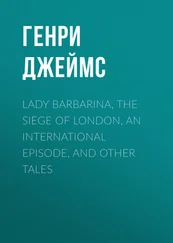The Consul flicked his cigar ash into the tray before him. “If you live another year among these Russians, you’ll see that they, too, are like everyone else. What do they argue about? What is there that’s worth arguing about?”
“It’s enough for one of them to make a remark, and the other starts an argument at once. And even if they’re both on the same side, there won’t be a thing said without a grand debate.”
“Most interesting,” said the Consul.
Rechnitz watched him concentrate on trying to drop the unconsumed ash, and went on, “The facts in themselves may not be of special interest, but the process is interesting, since it repeats itself no matter what the circumstances may be, and one knows from the start that whatever Mr. Greenberg says will be contradicted by Mr. Berggreen.”
Ehrlich smiled. “You made up those names, my dear fellow.”
“Well,” said Rechnitz, “it’s true that nobody here is called Greenberg or Berggreen, but a number of people have names that are the reverse of one another.”
“And what about the Sefardim?” the Consul asked.
“I’m not acquainted with them. They stay in their own homes and don’t mix with the Ashkenazim. Perhaps they lack a social sense. Besides, they regard themselves as kings who have been deposed and are angry at us Ashkenazim for presuming to reign in their place. But I know the Yemenite Jews a little. They’re a nimble, quick-witted tribe, who love work and are very studious and pious too. We have a Yemenite caretaker at our school. He has the face of a prince, and everything he sees sets his mind working. Once he asked me, ‘Why is it that King David says: Thou hast set a boundary, they shall not cross it, they shall not return to cover the earth? God has set a boundary to the waters of the sea, that they shall not go up on the dry land. And yet we see that the waters of the sea do go up on the dry land.’”
“And how did you answer the Yemenite?”
“What could I reply?” said Rechnitz. “I didn’t give him any answer, but I sighed deeply, as one does when regretting that things are not as they should be.”
“That’s the best answer of all,” the Consul said. “But here I’m smoking, and I haven’t offered you a cigar. Actually it’s a sin to smoke tobacco in this wonderful fragrant air. But what can I do? It’s my addiction. If I’m reading a newspaper or talking to someone, of course I smoke. And if I’m neither reading nor talking, I smoke out of sheer boredom.” He laughed in the way people do who make fun of their own weaknesses and yet are quite contented with them. “Well, if you don’t want a cigar, let’s have a sip of brandy.”
The Consul tasted some brandy. “Not bad, really,” he commented. After a second glass he gave it fuller praise.
“This brandy,” said Rechnitz, “comes from Rishon LeZion. How about our going there, sir? You will see a great wine press that has no equal in Europe.”
The Consul smiled a little patronizingly. “I doubt if I shall have time. After all, one can’t visit the Holy Land and not go to Jerusalem, and we’ve only another four days. You must have been there already. Some tourists I met on the way were not impressed with Jerusalem, you know. Dirt and beggars, they said; nothing but beggars and dirt.”
“Were they Christian or Jewish tourists?”
“What does that matter? It’s a holy land for Christians, too.”
The conversation then took a strange turn. Rechnitz blushed and said nothing.
“If the air of Jerusalem is as fine as that of Jaffa,” said the Consul, “that will be good enough. I’ve not found the like of it anywhere. And the old Baron says so too. Do you know him? He was a general in Africa, or a governor for his king, or some such dignitary. What do you think, Jacob? Shall I settle down here? My late father’s grandfather came to Jerusalem an old man, and passed away there at the end of a ripe old age. I remember when I was a child, a charity collector from Jerusalem came to the house and my father gave him money. And every year printed matter used to come from there, and every Rosh Hashanah eve my father would send a contribution. I was approached, too, on behalf of the Land of Israel; they tried to get me to buy shares in the Settlement Bank. I said to them, ‘If it’s charity you want, I’m ready to give you something; but what have “settlement shares” to do with the Holy Land? Old men go there to die, but what have young men to go for?’ — I’m not referring to you, my friend; you came for the sake of your research, and science has its place everywhere!”
As Rechnitz was about to reply, the waiter came up to announce that their table was ready. The Consul nodded, and said, “We have been talking for a good while now, and all the guests should have had time to finish their meal. Waiter, see if my daughter is ready for dinner.”
XIII
When the three of them were seated at dinner, the Consul turned to Shoshanah and asked, “Well daughter, how did you spend your day? I don’t think I’ve seen you since we finished lunch.”
Shoshanah replied, “Ask our guest that question: he will tell you.”
“How should Dr. Rechnitz know?”
Jacob lowered his head as his host asked, “Well Doctor, how did our friend Fräulein Shoshanah Ehrlich spend her day?”
What did Rechnitz know about Shoshanah’s doings? For a brief moment he had caught a glimpse of her in the garden while he was walking with Rachel and Leah, before she disappeared, leaving him nothing to remember but her nod. He looked at her in perplexity.
The Consul smiled. “Evidently you have a secret between you. Well now, let’s ask Dr. Rechnitz how his day was spent.”
Now, thought Rechnitz to himself, I suppose Shoshanah will say, “Ask me.” But Shoshanah said nothing.
The Consul filled their glasses and drank to their health. As Rechnitz drank, he reflected on how tomorrow they would be traveling on to Jerusalem and he would return to his own affairs. And how they would come back to Jaffa, and leave again.
Shoshanah was seated on the Consul’s left, facing Jacob. Her spirit seemed to have sunk deep down into her being, or to have fled her body entirely. A light breeze was blowing in; the scent of lemon and orange trees filled the dining room. The lamp on the table shone with double brightness, and the sides of its white base grew red. From the gardens and the citrus groves came the cry of jackals, and the parrot in its cage stirred itself to echo their high-pitched screams. Suddenly the sea awoke; its waves pounded and a pleasant sea smell mingled with the fragrance from the gardens and groves that girdle Jaffa.
The Consul raised his glass: “Go tell my countrymen that while they’re sitting over their cabbage with their blood congealing from the cold, we here take dinner by the open window! Are you cold, Shoshanah? What are you bringing us now, waiter — black coffee? If I drink coffee at night, I can’t sleep. Every age has its own customs: our forefathers used to take drinks that put them to sleep, but now we try to keep ourselves awake. After all, is there anything in the world worth staying awake for? Those scents from the garden are most exhilarating: a mixture of jasmine and orange blossom, isn’t it?”
Shoshanah sat in silence. Those exhilarating scents were putting her to sleep. Without a word, she stood up from the table and kissed her father’s brow.
“Are you going up to your room, my daughter?” he asked.
“Yes, Papa.”
Herr Ehrlich kissed her on the cheek and said good night. Shoshanah gave her hand to Jacob, then left.
The Consul watched her leave and said, “Shoshanah is rather tired; I don’t think we shall go to Jerusalem tomorrow. What will you be doing?”
Читать дальше












